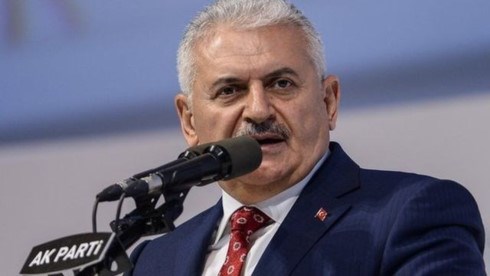
Turkish Prime Minister Binali Yildirim’s official visit to Vietnam from August 22-28 is a chance for the two countries to seek measures to beef up and deepen the bilateral partnership in trade, investment, science-technology, transportation, education-training and other fields.
The visit takes place
when the ties between Vietnam and Turkey are growing soundly, with regular
exchange of delegations and many cooperation agreements signed in trade,
science-technology, agriculture and security.

Turkish Prime Minister Binali Yildirim
Vietnam and Turkey set up
diplomatic relations on June 7,
1978. In February 1997, Turkey established its
embassy in Hanoi. In October 1999, Vietnam opened a Trade Representative Office
in Istanbul and in July 2002, Vietnam launched its Consulate General, also in
Istanbul. The Consulate General was upgraded to an embassy and moved to Ankara,
the capital city of Turkey, in October 2003.
Turkey is the leading
trade partner of Vietnam in the Middle East. Last year, two-way trade reached
1.51 billion USD, with Vietnam earning 1.36 billion USD from exports to Turkey.
Currently, Turkey firms are running 15 projects worth 704 million USD in
Vietnam, ranking 26th among foreign investors in the country.
In June 2016, the Turkish
Airlines opened an air route connecting Hanoi and Istanbul through Ho Chi Minh
City with seven flights per week. Earlier, the two countries signed agreements
on aviation, maritime transportation and double tax avoidance.
At the seventh meeting of
the Vietnam-Turkey joint Committee on economic and trade cooperation in Hanoi
on July this year, the two sides agreed to support each other at international
and regional forums, while strengthening the exchange of delegations at all
levels and expanding foreign relations activities to raise trade revenue to 4
billion USD in 2020.
The two sides also
concurred to strengthen cooperation to support small and medium-sized
enterprises, and foster affiliation in investment, customs, quality standards,
energy, food processing, construction and machinery.
Source: PANO
The first summit between the European Union (EU) and the Gulf Cooperation Council (GCC) in Brussels, Belgium, marked an important step forward in their bilateral relations.
The 45th General Assembly of the ASEAN Inter-Parliamentary Assembly (AIPA-45) opened in Vientiane on October 19.
Many countries are grappling with rapidly aging population. As population aging becomes an irreversible global trend with significant impacts on economic and social sectors, nations face the urgent task of creating flexible policies to adapt to and make the most of this trend to build prosperous and sustainable societies.
With a series of stimulus measures, the world tourism industry is on the way to recovery as before the COVID-19 pandemic broke out. Facing the opportunity to take off, the "smokeless industry” is expected to strongly contribute to global economic growth while promoting potential and cohesion, contributing to peace and sustainable development.
The danger from the COVID-19 pandemic is still latent, threatening people’s health and lives in the context that the immunity provided from the COVID-19 vaccine has decreased. Many other dangerous diseases are also likely to break out when the global vaccination rate slows down, due to inequality in access to health services, vaccine hesitancy, and consequences of economic recession.
The Association of Southeast Asian Nations (ASEAN) is witnessing a rise in the sales of electric vehicles (EVs) in Vietnam, Malaysia and Indonesia, according to Maybank Investment Bank Research (Maybank IB Research).



